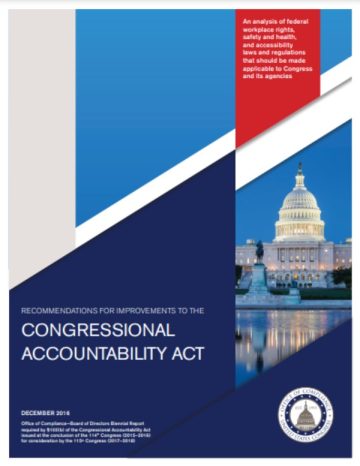STATEMENT FROM THE BOARD OF DIRECTORS
The Office of Compliance (OOC) officially opened its doors on January 23, 1996. This year marked two decades that the OOC has been advancing workplace rights, safety and health, and accessibility for workers and visitors on Capitol Hill as envisioned in the Congressional Accountability Act of 1995 (CAA). That landmark legislation was a promise by Congress that it would hold itself accountable to the same federal workplace and accessibility laws that it requires of private sector employers and executive branch agencies.
The CAA was crafted to provide for ongoing review of the workplace laws that apply to Congress. Section 102(b) of the CAA tasks the Board of Directors of the OOC to do just that. Thus, every Congress, the Board reports on:
whether or to what degree [provisions of Federal law (including regulations) relating to (A) the terms and conditions of employment (including hiring, promotion, demotion, termination, salary, wages, overtime compensation, benefits, work assignments or reassignments, grievance and disciplinary procedures, protection from discrimination in personnel actions, occupational health and safety, and family and medical and other leave) of employees; and (B) access to public services and accommodations]…are applicable or inapplicable to the legislative branch, and (2B) with respect to provisions inapplicable to the legislative branch, whether such provisions should be made applicable to the legislative branch.
Today, the Office of Compliance enforces 13 federal laws relating to workers’ rights, safety and health, and public access to programs and accommodations for individuals with disabilities. The key recommendations of this biennial report to the 115th Congress, if adopted, would go a long way toward closing the gap in those current protections for legislative branch employees. As described in more detail in this Report, the Board is making four recommendations—
- Congress should approve the regulations that have been carefully considered and adopted by this Board to implement the Family and Medical Leave Act (FMLA), the Titles II and III of the Americans with Disabilities Act (ADA), and the Uniformed Services Employment and Reemployment Rights Act (USERRA) in the legislative branch.1
When an employee of the legislative branch or their loved one experiences a serious health condition that requires time off from work, the stress from worrying about keeping their job may add to an already difficult situation. The Family and Medical Leave Act (FMLA) was passed in 1993 in response to this concern. Clear regulations are necessary to improve communication between employees, employing offices, and health care providers and to make the law operate more smoothly, as the law itself does not identify the means for employees to communicate their FMLA requests and does not outline requirements for granting leave. The Board-adopted regulations ensure that same-sex spouses are recognized under the FMLA, in accordance with Supreme Court rulings, and further extend important protections for military caregivers and service members.
Titles II and III of the Americans with Disabilities Act help individuals with disabilities gain access to Capitol Hill and public programs through mandated barrier removals and reasonable accommodation. The Department of Justice issued new standards and regulations in 2010 that differ substantially from the 1991 standards and regulations. The current OOC regulations pending before Congress are now obsolete and must be updated. The Board’s adopted regulations will avoid costly construction and contracting errors that result when there is uncertainty or ambiguity regarding what standards apply, and will improve access to Capitol Hill for visitors and employees with disabilities.

